“Biggest Losers Become Biggest Gainers,” “The Lost Hope Of ‘The Biggest Loser’” and “’Biggest Losers Lose Battle Against The Returning Bulge” are just a few of the sad but true headlines that started making the rounds at the end of last week. The headlines were responding to a study released last Friday in the journal Obesity that checked up on 14 of The Biggest Loser contestants after six years and found that many had regained the pounds they shed during their stint on the reality TV program. And that’s not all. The study also revealed that many of the contestants had an even slower metabolism than they did before they went on the show.
The results of the study confirm what many health experts have been saying for many years now: Crash diets don’t work. In fact, for some people, they may do more harm than good on both health and weight in the long run.
The willpower myth
For many years, the diet industry and shows like The Biggest Loser have sold us on the idea that with hard work and discipline, we can all achieve quick and permanent weight loss. This is a wonderful, positive premise that also aligns quite well with the US’ protestant-based belief that anything can be achieved through hard work, commitment and persistence. Unfortunately, most research suggests that it’s just that—a belief. In fact, most studies agree with the recent Biggest Loser study, finding that in the long run, dieters who drop pounds quickly not only put the weight back on, they also end up with a slower metabolism and the potential for other unwanted health problems.
Neuroscientist Dr. Sandra Aamodt, writing for The New York Times, explains why this happens: “The root of the problem is not willpower but neuroscience. Metabolic suppression is one of several powerful tools that the brain uses to keep the body within a certain weight range, called the set point. The range, which varies from person to person, is determined by genes and life experience. When dieters’ weight drops below it, they not only burn fewer calories but also produce more hunger-inducing hormones and find eating more rewarding.”
Aamodt goes on to explain that when people drop pounds quickly, the brain believes that the body is starving and uses every tool it has to keep your weight where it thinks it should be, thus preventing the dieter from losing weight and keeping it off. And despite what fad diet ads and shows like The Biggest Loser would have you believe, the chances that any individual will be able to quickly lose a significant amount and keep it off in the long term is very, very low.
According to Aamodt: “For example, men with severe obesity have only one chance in 1,290 of reaching the normal weight range within a year; severely obese women have one chance in 677. A vast majority of those who beat the odds are likely to end up gaining the weight back over the next five years.”
Sustainable holistic lifestyle changes lead to weight loss and better health
This study absolutely does not mean that people don’t have the power to make changes that will transform their health. We do! Unfortunately, we often turn to quick fixes, fad diets and obsessing over calories and the digits on the scale when we should be turning to whole foods, exercise and stress reduction—the real keys when it comes to weight loss and improving health.
Aamodt finishes her article with a rather controversial statement: “I finally gave up dieting six years ago, and I’m much happier. I redirected the energy I used to spend on dieting to establishing daily habits of exercise and meditation. I also enjoy food more while worrying about it less, now that it no longer comes with a side order of shame.”
Although it goes against the conventional idea that we should focus on weight loss in order to achieve better health, I have to agree with Aamodt. Maybe it’s time we all throw out the scale, quit dieting and choose to love our bodies by nourishing them with healthy, whole foods, moderate exercise, and plenty of relaxation. There’s no need to try to be the “Biggest Loser”—when we make health our first priority, we have so much to gain.
– Dr. Joshua Levitt









